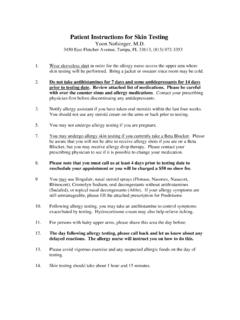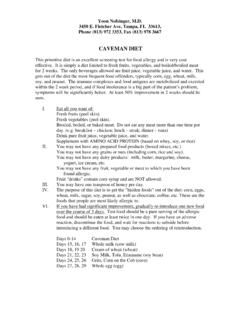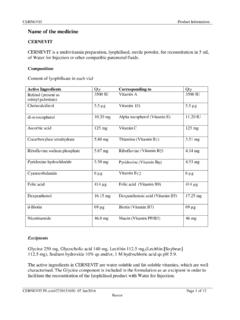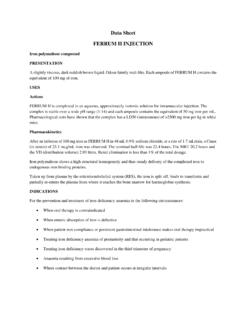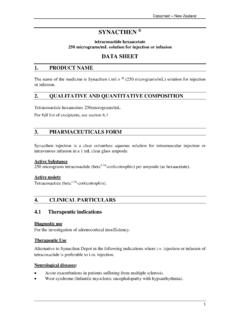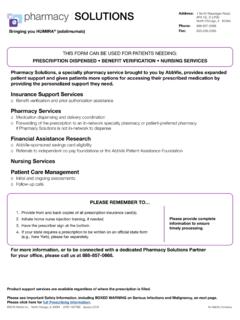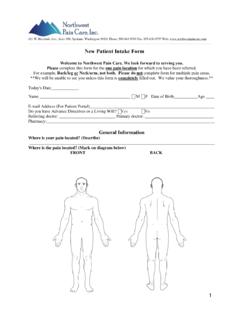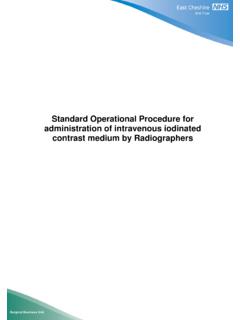Transcription of General Information: Allergies and Injection Therapy
1 Yoon Nofsinger, Tampa ENT Associates, 3450 East Fletcher Avenue, Tampa, FL 33613. Phone (813) 972-3353, Fax (813) 978 3667. General information : Allergies and Injection Therapy 1. General : You have been allergy tested and have Allergies . The specific items which you are allergic to (such as grasses, weeds, dust mite, or food) are called allergens. You have chosen to receive allergy shots. Your treatment vials are made up of various concentrations of allergens. They are not drugs or medications. Each patient's vial is individually mixed in accordance with allergy testing results.
2 Once allergy injections are started, your dosage is gradually increased to the maintenance dose, which is the strongest dose which can be given. Our goal is to gradually strengthen your allergy shot to the maintenance dose which is then continued for a prolonged period. Allergy shots are given in the office once a week, and everyone must wait for 30 minutes after every shot, but once your reach your maintenance dose, you may give yourself allergy shots at home. How quickly you reach the maintenance dose depends upon the severity of your symptoms and your ability to come each week for your shots.
3 Choosing to undergo allergy Therapy is a long term commitment. In order to fully benefit from allergy treatment, you should receive allergy shots for three to five years. Allergy shots decrease your immune response toward allergens but do not affect your immune response toward bacteria or viruses. Unlike medications which are only effective as long as your are taking them, allergy shots have long term benefits even after discontinuing them, and allergy shots are much more effective than medications in controlling your symptoms. Allergy shots change your immune system so that it is not activated by common things such as pollens, mold spores, dust particles, or animal dander.
4 This process is called desensitization. 2. Prognosis: We expect you to have gradual improvement of allergy symptoms with allergy injections within 3-12 months. 80-90% of people will have significant improvement. 70% of patients will have longstanding benefits even after discontinuing allergy shots. If you do not feel that you are getting better, you should make an appointment to see Dr. Nofsinger. There may be other factors, such as food and chemical Allergies or infections, which need to be investigated. 3. ADVERSE REACTIONS: LOCAL REACTIONS: After an allergy Injection , you may have some redness and itching at the Injection site or you may have no reaction at all.
5 If you have an arm reaction, you should note the size (cm) and duration (24 hours, 3 days, etc.) of the arm reaction, and report this to the allergy nurse prior to your next Injection . Arm reactions smaller than a quarter and lasting less than 24 hours are normal. We will weaken your dose if you have large arm reactions. It is better to tell us about your arm reaction when you come to the office for your next allergy shot, rather than calling and leaving a message. It is our protocol that before getting an allergy shot, the medical assistant will always ask you about any problems you may have had with your last Injection .
6 You should tell the staff about your arm reaction at this time. For bothersome arm reactions, you may put topical steroid or Benadryl cream. You may take an antihistamine before your Injection to decrease these local reactions if necessary. A few patients may be unable to receive allergy shots due to large arm reactions, and should consider allergy drop Therapy instead. MILD SYSTEMIC REACTIONS: Following your allergy Injection , you may also develop worsening of allergy symptoms (example: runny nose, congestion, headache, fatigue, cough, shortness of breath.)
7 Or flu- like symptoms (fever, fatigue, achiness). It is important to report any adverse reactions to the allergy nurse prior to your next Injection . The allergy nurse will weaken your next treatment dose if necessary. It is sometimes difficult to attribute worsening allergy symptoms to the allergy shot because there can be normal fluctuations in your asthma or allergy problems. To manage mild reactions, take your usual allergy and asthma medications. If your symptoms do not improve, then please call the office for additional recommendations. SEVERE SYSTEMIC REACTIONS/ANAPHYLAXIS: It is very unlikely, but possible, that you may develop a life-threatening systemic reaction, called anaphylaxis.
8 Fortunately, it is very unlikely. The risk of anaphylaxis is Symptoms of anaphylaxis include: facial swelling, hives, wheezing, throat swelling, difficulty breathing, dizziness, drop in blood pressure, and in rare instance, even death. Anaphylaxis usually occurs within minutes after receiving the allergy Injection , therefore, you must wait in the allergy office for 30 minutes after each Injection . If these symptoms occur after leaving our office, you can self-administer the Epi-Pen, take an oral antihistamine, and go to the nearest emergency room. You should carry your Epi-Pen and oral antihistamine with you at all times.
9 You should also check the expiration date on your Epi-Pen and keep it updated. Make sure you understand how to administer the Epi-Pen. 4. Contraindication to Allergy Injections: a). You must discontinue allergy injections if you develop an anaphylactic reaction. These patients should consider allergy drop Therapy because there is no risk of anaphylaxis. b). Beta Blockers and Some Antidepressants (Tricyclic antidepressants and MAO. Inhibitors): You cannot receive allergy injections if you take a beta-blocker (inhaler, eye drops, or pill form) and some types of antidepressants.
10 Inform the allergy assistant of any new medications. See the following list of Beta Blockers. These medications increase your risk for anaphylaxis and the medical management is more difficult. 5. Pregnancy: If you become pregnant during the course of treatment, you may continue receiving your allergy injections with medical clearance from your obstetrician. We will not advance the dosage of the allergy Injection until after your delivery. If you are considering getting pregnant, please do not start allergy injections until after your delivery. ALLERGY Injection PROTOCOL.
